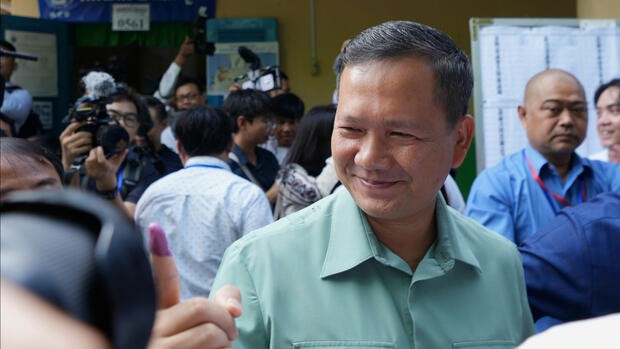Bangkok With an election victory without opponents, Cambodia’s long-term ruler Hun Sen is preparing for a generational change after almost four decades in power. His son, Hun Manet, is expected to take over the leadership of the Southeast Asian country in just a few weeks.
According to observers, a new start under the 45-year-old economist with the rank of general offers the chance of a rapprochement with the West after Cambodia had recently fallen deeper and deeper into China’s sphere of influence. But the massive democratic deficits remain an enormous hurdle.
The United States condemned Sunday’s parliamentary elections as “neither free nor fair” and announced new sanctions. The 70-year-old authoritarian ruler Hun Sen made sure that his governing party, the CPP, did not have to deal with any serious competition in the vote: for years he has been cracking down on opposition members, some of whom ended up in prison or had to flee into exile. The only party that still had something to oppose the regime, the so-called Candlelight Party, was not allowed to vote because of an alleged formal error.
Hun Sen, who came to power in 1985 and is now one of the longest-serving heads of government in the world, was victorious before a single vote was cast. Not surprisingly, the CPP claimed on Monday that it had won almost all of the 125 parliamentary seats. The party headquarters in Phnom Penh spoke of a “landslide victory”.
Prime Minister’s son Hun Manet thanked those who voted “for the party they love”. He failed to mention that hundreds of thousands had cast invalid ballots in protest despite the threat of penalties.
criticism of the election
A coalition of Southeast Asian human rights politicians criticized the election as a farce. “The international community must not fall into the trap of legitimizing this staging,” urged the Indonesian MP and representative of the organization ASEAN Parliamentarians for Human Rights, Eva Kusuma Sundari.
The United States condemned Sunday’s general election as “neither free nor fair” and announced new sanctions.
(Photo: Reuters)
In response to the vote, the US government announced that it would freeze individual aid programs for Cambodia and impose visa bans on people who undermine Cambodia’s democracy.
A possible restart of relations between the regime in Phnom Penh and the West under the designated future Prime Minister Hun Manet is thus heavily burdened. Above all, his biographical proximity to America and Europe raised hopes for better relationships: Hun Manet attended the US military academy at West Point, where he was the first Cambodian to graduate.
He later studied economics at New York University and received his doctorate in economics from the University of Bristol in the UK. “There has long been a notion that Hun Manet will be friendlier to the West than his father was,” commented Charles Dunst, a researcher at the US think tank Center for Strategic and International Studies.
Transfer of power possible in a few weeks
For a long time, Hun Sen left open the exact timetable for handing over power to him. However, he said last week that Hun Manet could become the new prime minister “in three or four weeks” if he was ready.
Hun Sen came to power in 1985 and is now one of the longest-serving leaders in the world.
(Photo: dpa)
The head of government made the announcement in an interview with a Chinese state broadcaster. That shouldn’t have been a coincidence: the government in Beijing had massively supported Hun Sen’s regime in recent years in order to secure influence in Southeast Asia. Hun Manet, who personally introduced himself to Chinese President Xi Jinping at the side of his father at the beginning of the year, will therefore also depend on China’s goodwill.
Xi’s financial aid has recently offered the government in Phnom Penh the only significant opportunity to give the population signals of an economic recovery after the West turned its back on the country.
In 2020, for example, the EU withdrew Cambodia’s duty-free market access due to human rights violations. On the other hand, there was more money from Beijing: As the most recent project, Hun Sen was able to celebrate the start of construction of a new 135-kilometer highway in June, for which China is providing 1.3 billion dollars.
The expressway is “another fruit of cooperation” between Cambodia and the People’s Republic, the ruler praised. Overall, last year China accounted for around 90 percent of foreign direct investment in Cambodia, which, with around 17 million inhabitants, is one of the poorest countries in Southeast Asia.
Hun Sen returned the favor for the investments with a China-friendly voting behavior in the Southeast Asian state association Asean – for example when it came to territorial conflicts in the South China Sea.
>> Read here: Asia’s emerging markets hold their own against the global downtrend
He is also working with China to develop a deep sea port on Cambodia’s coast that the US believes will contain a secret Chinese military base.
The human rights activist and head of the Cambodian think tank Future Forum, Ou Virak, does not believe in a significant change in geopolitical course given the close ties: “China is still Cambodia’s most important supporter,” he says. And the government in Phnom Penh cannot afford to alienate this supporter.
More: Southeast Asia: Military blocks democratic election winner
